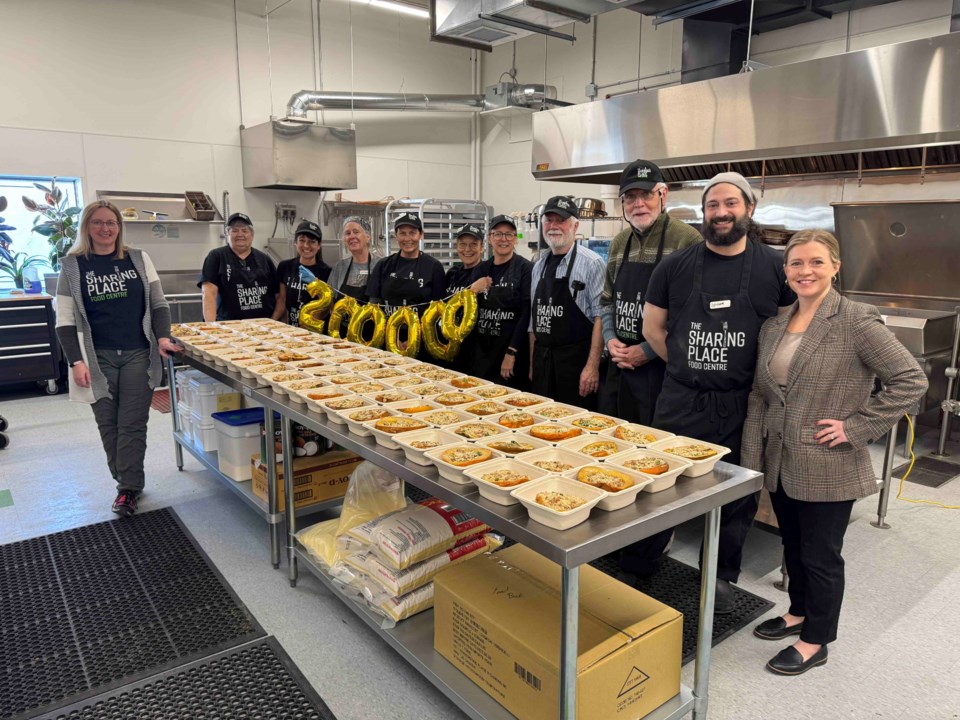The Sharing Place Food Centre celebrated a major milestone today, preparing its 200,000th meal through the Meals for Change program.
What began in the fall of 2020 in a local church kitchen with just three volunteers has grown into a "vital" initiative serving hundreds of community members each month.
The Meals for Change program originally operated just once a week, but by the fall of 2023, the Sharing Place had built its state-of-the-art kitchen to significantly increase production.
In 2024 alone, the program prepared nearly 100,000 meals, providing nutritious, ready-to-eat meals to individuals and families facing food insecurity.
The food bank's development manager, Kelly Allen, calls the Meals for Change program the “puzzle piece that completes the Sharing Place.” By utilizing ingredients rescued from grocery stores, community partners, and local farmers, the program maximizes food recovery efforts while ensuring that surplus or bulk items are put to the best use.
“If we get something in a bulk format, it makes more sense to put it in a meal than it does to give it through other programs,” Allen explained. “For example, if we receive a huge roast, it makes more sense to put it into 20 meals than it does to give it to one person.”
The meals are distributed through food bank orders at the Sharing Place and shared with 10 agencies and community organizations, including the Lighthouse, Helping Hands, and the Freezer of Love.
“Those organizations can really identify who’s suffering from food insecurity and who can really use these meals,” Allen said. “It’s distributed based on need.”
Currently, the Sharing Place kitchen runs four days a week, producing 2,000 meals weekly with the help of 45 dedicated volunteers. However, with growing demand, the organization is already looking at ways to expand.
“At the increased rate that we are seeing people coming to use our food bank programs, we know that the 2,000 meals we make a week aren’t going to be able to sustainably meet the needs of the community,” Allen said. “We are looking for creative ways to increase that input.”
Kitchen manager Nancy Hannah, who has been involved with Meals for Change since its inception, says the program may need an additional kitchen day or new equipment to boost efficiency.
“We know that 2,000 meals a week sounds like a lot,” she said. “At the end of the week, our freezer is empty, and we have to hustle to get those numbers back up.”
Hannah emphasized the impact these meals have on vulnerable individuals, including those who cannot get to the grocery store, afford nutritious food, or prepare meals themselves.
“These meals are pre-cooked and ready to go," she said. "That’s what makes it so great."
She also credited the program’s success to its volunteers, whose dedication fuels the program.
“I’m astounded that week after week, our team of 45 volunteers keeps showing up,” she said. “Nobody pays them to come, nobody forces them to be here, but they choose to do it.”
Beyond the impact on food security, volunteering also creates a strong social community, she explained.
“We always have great music going, there’s lots of giggles and laughs, and for them, it’s a social connection,” Hannah said. “They are also learning and improving skills organically through what they are doing.”
As the demand for meals grows, Hannah encourages community members to support the Sharing Place by donating or volunteering. Each meal costs just $2 to produce, but continued financial support is necessary to keep the program running.
“As much as we can keep the cost of these meals relatively small, and the partnerships we have through the food recovery team are amazing, there still is a cost associated with what we do,” she said.
